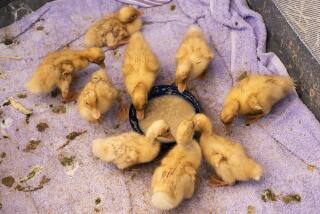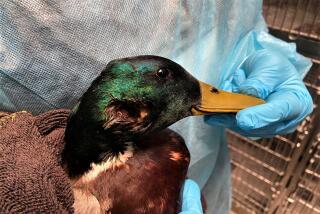Procreating Ducks Living Precariously
- Share via
Procreating can be a matter of life and death in the duck world.
At the Reseda Recreation Center pond, ducks squabble over turf and fight over mating partners. If they aren’t drowned or pecked to death by their enemies, they have to worry about dodging traffic on Reseda Boulevard to lay their eggs across the street.
Several ducks, possibly disoriented after mating at the pond, met their deaths recently after they were hit by cars, according to park officials. The birds were described as migratory wild mallards, said Lee Nichols, spokesman for the city Department of Recreation and Parks.
Chris Privett, a Tarzana real estate agent, said she dodged the dead ducks while driving on Reseda Boulevard on a recent morning. She watched as other ducks teetered precariously on the curb’s edge.
Privett said she stopped at a nearby bakery, picked up some bread and lured some of the ducks back to the pond, which is not fenced.
It is not uncommon for ducks to die during mating season, said Tom Hutchinson, director of the Reseda Recreation Center. Ducks are territorial and will fight, peck or drown other ducks during mating. As at other ponds, the duck population at the Reseda park is dense. Migratory birds make their seasonal homes there, and domestic ducks who have outgrown their Easter baskets are often left there, said David Gonzales, a park maintenance worker.
Because of the density, some female ducks choose to lay their eggs away from the pond to avoid the other ducks, but sometimes are killed when they cross in traffic.
Privett suggested a fence could stop the ducks from wandering into the street, but park officials said a fence wouldn’t prevent them from flying away.
“That’s an area where there’s fishing and kids around feed the ducks,” Nichols said. “A fence would inhibit some of the recreational activity in the area.”
Bird enthusiasts suggested that although the mallards were migratory, months of hand feeding by local residents could have domesticated them, diminishing their fear of humans and possibly traffic, said Muriel Kotin, conservation chairwoman for the San Fernando Valley Audubon Society.
More to Read
Sign up for Essential California
The most important California stories and recommendations in your inbox every morning.
You may occasionally receive promotional content from the Los Angeles Times.













